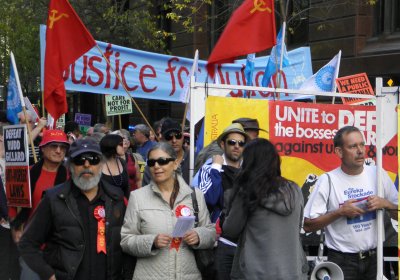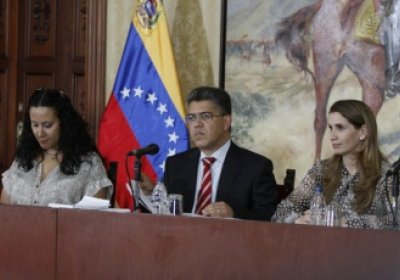A protest was held outside the Department of Foreign Affairs and Trade in Sydney on March 19, to oppose the controversial state visit by the Myanmar president Thein Sein.
Prime Minister Julia Gillard met with Thein and announced a $20 million two-year aid program, as well as the posting of a resident military attache and a trade commissioner in Yangon.
Protesters representing the Rohingya, Karen and Kachin communities demanded the Australian government address the gross human rights abuses before business and military deals are made.
Photos by Peter Boyle.
Issue 959
News
As an Aboriginal woman, from the Kairi and Gubbi Gubbi nations of central Queensland, I identify with oppressed people around the world and I see our liberation as tied closely to that of other indigenous and subjugated peoples.
In September last year, I had the great pleasure of participating in the Australian Venezuelan Solidarity Network Brigade.
More than 200 people attended the "Todos Somos Chavez — We Are All Chavez" memorial meeting at the Addison Community Centre on March 16.
The event was one of several memorials held around Australia to honour the life and political struggles of Venezuelan socialist leader Hugo Chavez.
Organised by the We Are All Chavez Committee, and supported by the Embassy of Venezuela in Australia, the event featured a night of toasts, music and videos in memory of Chavez.
Several prominent people have signed a letter to the Australian government calling for Jock Palfreeman, a young Australian in prison in Bulgaria, to be brought back to Australia.
Supporters of the call to bring Palfreeman home include author and documentary filmmaker John Pilger, Julian Burnside QC, former NSW Greens MP Sylvia Hale, author Antony Loewenstein, Moreland City Councillor Sue Bolton, Vivienne Porzsolt from Jews against the Occupation, Green Left Weekly editors Mel Barnes and Stuart Munckton and Professor Wendy Bacon.
The Victoria Refugee Action Collective held a forum on March 20 called “Persecuted in Sri Lanka, detained in Australia: the plight of Tamil refugees”.
Former journalist Trevor Grant said the Australian public has been taught to be fearful of refugees. The language used to speak about them — including terms such as “illegal” and “border protection” — is designed to create fear.
Grant, who is active in the Tamil Refugee Council, spoke of the use of torture and rape by Sri Lankan government forces against Tamils.
There has long been support across Australia for sustainable job creation. With new environmental technologies being created at a rapid pace, green jobs have been created in installation and retail — but what about sustainable manufacturing?
There is now a push for sustainable jobs that consider the future of communities where local jobs are reliant on coal, such as Morwell in Victoria’s Latrobe Valley.
A protest against racism outside Labor MP Tanya Plibersek's office on March 21 demanded an end to the Northern Territory intervention and its expansion into areas such as Bankstown in south-west Sydney.
Stop the Intervention Collective Sydney (STICS) organised the rally, which highlighted the small but significant steps being taken to bring Aboriginal communities, unions and others together to prevent the spread of these apartheid-like policies.
The protest was held on International Day for the Elimination of Racial Discrimination and national Close the Gap day.
This letter was read out to 300 people who rallied in Campbelltown, NSW on March 17 to protest against coal seam gas (CSG) expansion in the area.
***
Good afternoon all. My name is Debbi Orr and I live in the Tara Estates — a gas field in Queensland.
Since CSG invaded our area, all of my six children have become sick. Headaches, nosebleeds, burning itchy eyes are a regular — sometimes daily — occurrence in our house.
10 years on from the beginning of the Iraq war, former marine and anti-war activist with Iraq Veterans Against the War, Vince Emanuele, speaks about his background and experiences in Iraq and more.
About 200 people attended a community forum on March 19 to discuss the future of policing at the Sydney Gay and Lesbian Mardi Gras parade. It was organised in response to community outrage over violent arrests at this year's parade.
The forum was called by the Sydney Gay and Lesbian Mardi Gras, the AIDS Council of NSW, Gay & Lesbian Rights Lobby, Inner City Legal Centre, NSW Police and independent MLC Alex Greenwich.
Green Left Fighting Fund
The mining companies’ best friend in the federal Labor government, former resources minister Martin Ferguson, supported a Kevin Rudd comeback and fell on his sword after the Labor leadership spill-that-wasn't.
Ferguson said he was resigning from cabinet and retreating to the backbench on March 22.
He said: “The class-war rhetoric that started with the mining dispute of 2010 must cease. It is doing the Labor party no good."
He appealed for Labor to "govern for all Australians" like the Hawke and Keating governments supposedly did.
Analysis
The National Tertiary Education Union (NTEU) at the University of Sydney is involved in an industrial battle with the administration over pay, conditions and casualisation.
As part of this campaign, the union held a 24-hour strike on March 6. Staff and students held pickets outside all campus entrances, and the university was largely shut down for the day.
The multiple picket lines converged on the main entrance to the university for a midday rally, which attracted hundreds of staff and supporters. There were many speakers including unionists, student representatives and the Greens.
A landmark ruling in Sydney on February 15 gave the biotechnology industry an unprecedented right to make huge profits from genetic testing.
The case involved the breast cancer genes BRCA 1 and BRCA 2 and the right of US biotechnology company Myriad Genetics to have exclusive licence to a patent over their use in research.
Federal Court Justice John Nicholas had ruled that a private company can continue to hold a patent over an isolated gene, in this case, the BRCA gene. The BRCA gene is responsible for repairing or removing defective DNA cells.
Do oil spills make good economic sense? A witness called by Canadian firm Enbridge Inc— which wants approval to build a $6.5 billion pipeline linking Alberta’s tar sands with the Pacific coast — told a recent hearing in British Columbia that the answer is yes.
Over the past year, we have seen a huge rise in activity around women’s rights in Australia and other parts of the world.
Attention has turned to a range of horrific individual tragedies as well as broader issues, including sexual assault and violence against women, the disparity in income between men and women, and a debate about misogyny.
Although the idea that feminism is no longer relevant still dominates, women know through experience that sexism is rife. They are learning to organise together and taking to the streets in large numbers to demand change.
The abortive leadership spill in the Labor party on March 22 was yet another demonstration of its total political bankruptcy.
Kevin Rudd's leadership ambitions may now be in the dustbin of history but Prime Minister Julia Gillard has won a pyrrhic victory.
The public watched this gross display of principle-free power play in disgust. It seemed to make a government led by Liberal leader Tony Abbott a virtual certainty.
Northern Territory Chief Minister Terry Mills was replaced by Adam Giles in a sudden leadership coup on March 13, while Mills was in Japan on a trade mission. This shift has led to backdowns from the Country Liberal Party (CLP) on some regressive policies but could pave the way for more attacks in the future.
Crikey’s Bob Gosford predicted the spill on March 5 and wrote a detailed account of it.
Having tried absolutely everything they could think of to win the support of voters besides push good polices in favour of working people, there was really nothing for Labor's parliamentary caucus to do except launch yet another leadership spill on March 21.
It might have been a farce that will help worsen Labor's defeat in September, but it did reveal one startling fact: Simon Crean is still in parliament. I know, right?
When coal seam gas company Metgasco announced on March 13 it had suspended its operations in northern NSW after a long community campaign against it, it was just the latest in a series of setbacks for the CSG industry.
It followed the suspension of an AGL project in Campbelltown in western Sydney after community protests. Another company, Arrow Energy, has withdrawn from NSW and wants to transfer its licence to Dart Energy so it can focus on expanding in central Queensland.
There are at least two truisms in Aboriginal affairs. The first is that the more things change, the more they stay the same. I’ll come back to that one. The second is that the road through Aboriginal affairs, while often paved with good intentions, is sometimes paved with bad ones.
I’m going to assume that when Minister for Indigenous Affairs, Jenny Macklin held a gun to the head of Alice Springs town campers and told them that unless they signed over their land for 40 years it would be compulsorily acquired, that her intentions were good.
World
US NGO Just Foreign Policy estimates that more than 1,450,000 Iraqis have died since the US-led invasion 10 years ago. In the 2004 US offensive on Fallujah, a stronghold of anti-occupation resistance, the large majority of buildings were destroyed or damaged.
US soldiers were also victims, used as cannon fodder by their rulers in an illegal war for corporate power. More than 4000 US soldiers were killed in Iraq, but even more have killed themselves after returning from the war zone. Thousands more have been wounded and/or suffer serious mental trauma.
The Real News looks at the gains made by Palestinian prisoners' hunger strikes against Israel.
Palestinian prisoner Ayman Sharawna, freed from Israeli prison in a deal that denies him the right to return to his West Bank home for a decade, was given a hero's welcome in the Gaza Strip on March 17.
The Morning Star said on March 19 that 36-year-old Sharawna ended his hunger strike in an Israeli jail and agreed to a plea bargain that will confine him to Gaza ― rather than his Hebron home ― for the next 10 years.
Greece's Coalition of the Radical Left (SYRIZA) came close last year to winning national elections standing on a program of rejecting brutal anti-austerity measures and pushing polices in favour of working people. SYRIZA leader Alexis Tsipras spoke to a large public meeting in London on March 15 on the need for radical, democratic changes across Europe. His speech is reprinted from Left.gr.
* * *
Not a single politician in Cyrpus's parliament voted for a brutal austerity deal that would see the government receive bailout funds in return for direct taxes on ordinary people's savings when it was put to legislators on March 19.
After days of angry protests on the streets and furious negotiations behind closed doors between the "troika" of the European Union, European Central Bank and International Monetary and Cyprus's government, a new deal for a 10 billion euro bailout was finally secured on March 24.
Former chairperson of the US National Intelligence Council, Thomas Fingar, received the 2013 Sam Adams Award for Integrity in Intelligence on January 23 for his role overseeing the 2007 US National Intelligence Estimate (NIE) on Iran.
The NIE report’s finding that Iran had no active nuclear weapons program gave lie to years of US-Israeli anti-Iran rhetoric, and has been credited with preventing a pre-emptive war against Iran.
Since Richard Nixon proclaimed the “War on Drugs” four decades ago, drug use around the world has skyrocketed.
From 1998 to 2008 alone, global opiate use rose 34.5%, cocaine 28% and marijuana 8.5%.
People in the US are the world’s largest users of cocaine, Colombian heroin, Mexican heroin and marijuana. When Nixon launched the “war”, his initial budget was US$100 million for the first year. This has ballooned year after year, until it was $15.6 billion for 2011.
Given this, here are many commentators who proclaim that the “war on drugs” has failed.
It takes more than an individual to upset the international chessboard as dramatically as it has been in the past decade.
Forces unleashed by the logic of capitalism have drawn a new geopolitical map, in which the United States has lost its former place as the world's centre of gravity and the ultimate arbiter of the key issues of the economy, politics and war.
Yet, though changes of such magnitude were obviously not the work of one person, the late Venezuelan president Hugo Chavez’s hallmark was a profound intuition of this impending change.
Washington has simultaneously called for cooperation from Venezuela and worked to undermine the oil-rich nation's interim government.
Shortly after the death of socialist president Hugo Chavez on March 5, the White House issued a statement expressing an “interest in developing a constructive relationship with the Venezuelan government”.
“As Venezuela begins a new chapter in its history, the United States remains committed to policies that promote democratic principles, the rule of law, and respect for human rights,” the statement read.
Venezuelan officials announced on Wednesday that they are breaking off talks with US diplomats, accusing the United States government of interfering in Venezuela’s internal affairs ahead of next month’s elections.
“This line of communication is now suspended, postponed until the United States gives a clear message about what kind of relationship they want,” announced Venezuela’s Foreign Minister Elías Jaua on Wednesday.
At the most highly contaminated US nuclear site, redundancy notices went out on March 18 to nearly 250 workers. More than 2500 others were notified they faced temporary layoffs of several weeks.
About 9000 people work at Washington State's Hanford Nuclear Reservation, which produced plutonium for US nuclear weapons during World War II and the Cold War.
Contractors are cleaning up the highly contaminated site and removing millions of gallons of radioactive waste for treatment at a plant now under construction.
It is one of the most bitter ironies of this century so far that a war carried out as part of the so-called war on terror turned out to be one of history’s worst acts of terror.
US NGO Just Foreign Policy estimates that more than 1,450,000 Iraqis have died since the US-led invasion 10 years ago.
That is a death rate of about one in every 17 or 18 Iraqis. The Iraq genocide — as we could easily call it — claimed more lives than the Rwandan genocide.
Culture
A selection of the past fortnight's celebrity news...
John Farnham voted Australia’s best singer of all time - who didn't make the cut but should have? http://bit.ly/11e6w7d
Blood On The Dancefloor Discuss Jesus And Rape Alegations In New Song http://bit.ly/14IaDvA
Marilyn Manson The New Face Of Saint Laurent http://bit.ly/16qMcAT
Justin Bieber's Pet Monkey Seized By German Customs http://bit.ly/XRqjFe
Boston Police Posing As 'Punks' Online To Get Information And Shut Down House Shows http://bit.ly/16pC0Zt
Austrian hardcore punks Astpai jack up heavy slabs of guitar with speeding snares and leering lyrics. They serve up a rare and biting musical take on Austrian politics. Green Left’s Mat Ward spoke to frontman Manfred Herzog, also known as Zock.
The Price of Valour: The Triumph & Tragedy of a Gallipoli Hero, Hugo Throssell, VC
John Hamilton
Pan Macmillan, 2012
393 pages, $34.99 (pb)
Captain Hugo Throssell, one of nine Australian soldiers to win a Victoria Cross for supreme bravery at Gallipoli in 1915, stunned his home-town audience of patriotic Australians in 1919 with his statement that “the war has made me a socialist”.
The Managed Heart, Commercialization of Human Feeling
Arlie Russell Hochschild
University of California Press, 2012
339pp, $39.95
Forcing front line staff to engage at a “personal level” with customers has been an increasingly obnoxious part of low paid workers’ employment.
To obscure the all-pervasive low quality of the “food” and “services” that capitalism offers, what is sold now is the “experience” of social interaction. Key to the Happy Meal is the “happy sale”.




























